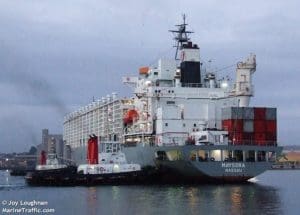
The livestock vessel MV Maysora: on cattle duties.
WESTERN Australian livestock exporter Livestock Shipping Services has not exited the live sheep trade, but is reviewing its operation after new Middle East shipment stocking density rules were implemented by the Federal Government.
LSS export manager Paul Keenan said the company was not exiting the trade, but is undertaking a short-term review of its Middle East live sheep business over the next eight weeks to prepare a long-term plan.
“We haven’t pulled out of the market, we are reviewing it,” he said.
During LSS’s review, the company vessels that recently shipped sheep to the Middle East, will be re-directed to South America on short-term charters for cattle consignments.
Click here to get the latest Sheep Central story links sent to your email inbox.
The LSS vessel, the Maysora, after discharging the remainder of its Middle East sheep consignments this month will be re-directed to South America, rather than coming back to Australia for sheep.
Mr Keenan confirmed the company had calculated that costs associated with the new northern summer stocking density and shipment rules amounted to an extra cost of $35 per sheep for the 70,000 sheep recently shipped under the regulations.
“We’ve got $300 million invested in the Australian sheep trade and are committed to it.”
This investment included shipping infrastructure and Middle East assets, including and abattoirs feedlots, to handle future Australian sheep consignments.
Industry is working through trade viability under new rules
Australian Livestock Exporters’ Council chief executive officer Simon Westaway reiterated that LSS was “absolutely committed” to the Australian live sheep trade into the Middle East.
“As you are probably aware they are a top two live sheep exporters in terms of volume out of Australia and a top two cattle live exporter.
“They’ve got $300 million invested, almost overwhelmingly in the WA economy; they are not going anywhere.”
Mr Westaway said ALEC supported the outcome of the McCarthy Review into the northern summer Middle East sheep trade and the ongoing work around the heat stress risk assessment recommendation, before introducing a new model in 2019.
“There is further work being done around the heat risk assessment — northern summer 2018 in effect is being used to analyse and research how the changes operate, but in particular how the changes in loadings deliver in terms of animal welfare outcomes, performance and the quality of the journey.
“The heat stress risk assessment really does change the game,” he said.
“The government made a decision to put the new arrangements in place to cover the entirety of the northern summer across the entire Middle East.
“The position of ALEC is that we support the McCarthy recommendations and excellent animal welfare outcomes, but we also highlighted in our submission to the McCarthy Review the specific issues around heat stress are more framed around the height of the northern summer – from the back end of July through August into early September,” he said.
“The region is obviously vast and there are different climatic condition in different parts, and we will be working closely with the regulator in terms of putting additional information into Dr McCarthy and the government to reinforce the differences by market.”
Mr Westaway said vessels taking sheep to the Middle East since mid-May have had independent observers and reduced loading densities.
“Exporters are obviously having to assess how that will impact their operations, but obviously animal welfare has to be pre-eminent, which has always been the case.”
When asked if he was concerned the proposed heat stress assessment model might make the Middle East northern summer trade unviable, Mr Westaway said the industry was “working through that at the moment.”
“The last thing we want to do as an industry is to be anything other than wanting to work with the government and industry stakeholders for a sustainable live sheep trade.”

Who do you think you are kidding Mr Westaway? “animal welfare has to be pre-eminent, which has always been the case.” In that great Australian term, bullshit. The sheep have been dying in those body cooking temperatures for years. The problem is it is now known by the Australian public. Politicians have also known. Profit from suffering should be your business slogan.